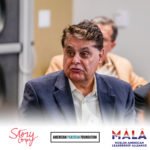Masood Malik: Providing a Platform for Change
This story was produced in partnership with American Pakistan Foundation.
I was born in Pakistan, and I came to the U.S. in the mid-seventies. I was born a Muslim but as I grew up and was able to think for myself, since then, I believe the most important principle of a human being is to be a good human being. And to be a good human being means to the extent, you should help those who are less fortunate than yourself. I believe that most of the people who are in the US are in the very fortunate category in this turbulent world. In human history of recorded history of ten thousand years, the western world, the US, provides the environment and stability and opportunities that do not exist and have never existed for most of humankind. So to that respect, for those of us who are in a better position, wherever we are, the most important, in my religion, is to do something better for those who are not as good as I am. That’s where I come from.
Most of my life, in the US, as I said I came in the mid-seventies, I went to school in George Washington, but I already had a bachelors degree in Bangkok, Thailand, after having grown up in Pakistan and doing a bachelors degree in Engineering. I had the opportunity to get a scholarship to Thailand, and I was able to study there. Then, I had the golden opportunity to come to the US as an immigrant. Here, I also did another master.
But most of my career here has been spent in international development, working for, in, and around the United Staes Agency for International development, and for a short time, for the World Bank and the Asian Development Bank. And one of my observations was in the case of USAID, which is funded by US taxpayers and spends huge amounts of money overseas for good causes and reasons. But somehow, the results are not as good as they could be. What I am talking about is the effectiveness of that aid. And it is US taxpayer’s money, their hard-earned money including my own. And having worked in International Development for a decade, I felt that there is something to be done to bring more information to USAID. Particularly by the ex-patriot communities in the US, like Pakistani American and other folks, who have a contact with Pakistan and they know the conditions there, and areas in which USAID would be helpful. So, they should give direct input to USAID. That was the reason why I came across some people, and I felt that the American Pakistan Foundation provided a good platform to make that idea happen.
In the American Pakistan Foundation, we provide a platform and try to empower people. As a platform, the first thing was to get engaged or be in contact with the community of Pakistani Americans. So, we have over 40,000 email addresses and chains that we can send to people. We have over 120,000 social media accounts, that I am not a participant of, it is more for the new generation and the millennials. So, we are providing those platforms. Then, we are also trying to empower our community, our community feels that because of its origin that other parts of the world, that is less fortunate than America, which Pakistan is the first of those. So, how can we help Pakistan develop and mature and prosper? So we have done certain things particularly, in the education center, to promote improving the quality of education there. We also run a fellows program, where Pakistani Americans, and other Americans who are interested, are sent to Pakistan for a short period and immerse themselves in the development of a social related issue in Pakistan, and then they come back. So, it’s an immersive experience for them, and then they are more aware of conditions there, and then they become ambassadors of a different way of life, and a different people that when they come in contact with them, they form certain bonds with them.
My home is now Northern Virginia, I have lived more of my life in America than anywhere else, in the world. It has been a great home. My second home, my ancestral home, is Pakistan. So that’s how I would describe it.


